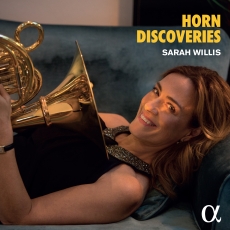Sarah Willis - Horn Discoveries - MusicWeb International
This disc is a reissue of a 2014 recording that was released under the aegis of horn makers Gebr. Alexander. Not quite a straight reissue as that original disc had the music in a (slightly) different order and also included a pair of “bonus” out-take tracks that for whatever reason have not been included here although another more recent bonus has been added. Horn player Sarah Willis is a ground-breaking performer. After an already stellar career, she joined the Berlin Philharmonic in 2001 and thereby became the first female brass player in the history of that great orchestra. Away from the concert stage she has done remarkable work in education and outreach quite literally around the world as well as embracing broadcast and social media platforms to popularise and demystify the world of Classical Music in general and the French Horn in particular.
In many ways the accessible and fun music presented on this disc is part of that same process. First and foremost, Willis is a stunning musician and player. So the actual playing on this disc, alongside violinist Kotowa Machida and pianist Philip Mayers, is quite gorgeous. This Alpha Classics re-release opens with a set of six arrangements of what might be termed “classical pops”. Essentially lyrical pieces arranged in a fairly standard way for horn trio. The composers involved are Tchaikovsky, Dvorák, Bizet, Debussy and Schubert. If I am being honest I slightly struggle with these arrangements. The playing is stunning, the music is lovely but I find myself asking “why?”. Arranger David Riniker (one of Willis’ colleagues in the Berlin Philharmonic cello section) favours a fairly straightforward transcription rather than reimagining arrangement and there is a certain formulaic approach. Philip Mayer’s piano provides a simple accompanying bed over which Kotowa Machida’s violin usually leads with the melody to Sarah Willis’ counter-melody/harmonising. The second subject reverses those roles and then the return to the first melody does the same. Riniker adds very few ‘new’ harmonisations or counter melodies so to be honest these feel rather functional. The other issue is the same that any composer/arranger faces with this combination of instruments. The simple fact is that even with playing as refined and sophisticated as here, the timbre of the horn is the dominant musical line. The engineering on the disc is excellent but the ear is drawn to the horn line and it is all but impossible for these three instruments to truly blend. So even when Willis plays the secondary line with as much skill and tact as she does, the ear is drawn to it despite the undoubted beauty of Machida’s violin playing. So a rather guarded welcome for this set of pieces and something really for the horn aficionado.
Next is Richard Bissill’s Song of a New World written especially for Sarah Willis and this CD. Bissill was one of Willis’ teachers at London’s Guildhall School of Music and his name will be wider known through his performing, composing and arranging for brass and especially London Brass and a couple of spectacular discs for Cala – “The London Horn Sound” and “Give it one”. Song of a New World is a fun and effective virtuoso piece for horn showcasing the range of the instrument which Sarah Willis demonstrates with aplomb. Written for just horn and piano there are none of the balance issues mentioned previously and both Willis and Mayers are completely at home in the bluesy swinging idiom. This is the longest single movement/work on the disc and I can imagine it proving very popular for audiences and players alike.
American composer Mason Bates’ Mainframe Tropics is another work written for Horn Trio. In the liner note Bates writes that this ensemble offers; “at least as many pitfalls as it does wonderful opportunities”. Bates adds some washers and screws onto the piano strings giving it a partially prepared/percussive sound. Across the work’s three movements Bates is brilliantly successful at avoiding the balance issues mentioned above. This is in part because the piano writing is much more active and dynamic in its contribution and also because he manages to give each of the instruments a distinct voice and role that suits their timbre, so no single instrument detracts from another. The three movements of the work are each quite short but very well defined and instantly appealing and evocative. The outer two movements; Silicon Blues and Greyhound are nervously rhythmic and bustle with energy. The central Marine Snow has a drifting hypnotic quality which contrasts beautifully with the other movements. Barely fifteen minutes long, this is a very attractive and enjoyable work to listen to but one that is very demanding of all three players. Again the quality of the music making on display here is of the very highest level with the electro-pop influenced idiom very well conveyed.
The last work on the disc is a set of five duets for two horns with the collective title of Willisabethan Sarahnade. The composer – and co-performer with Sarah Willis – is another of her colleagues from the Berlin Philharmonic, Klaus Wallendorf. These are light-hearted and affectionate brief pieces which you have a nagging suspicion are full of in-jokes and sly horn-player references that blissfully sail over the heads of those not quite in the know! Again brilliantly played with skill and easy bravura. I am not sure how often I would choose to listen to these miniatures but I can imagine them becoming cornerstones of every horn players ‘just for fun’ repertoire. Alpha-Classics have snuck a little “Easter Egg” onto the end of this disc. The final track is listed as 1:39 but is nearer to 5:00 in length. After a quite extended silence of about 30 seconds we get a complete performance of Qué rico el mambo which has been taken from another Sarah Willis album, Mozart y Mambo featuring the massed “Havana Horns”. It’s another great fun piece that bubbles with energy, skill and good humour – in fact all the qualities that imbue this disc too.
Undoubtedly, horn and brass specialists will get especial pleasure and appreciation from this disc understanding as they do the remarkable level of skill and ability on display (from all parties). The music alone has little if any aspiration to be substantial or significant but in place of any great substance there is a lot of finesse and skill in the writing. These may not be major “discoveries” but they are certainly enjoyable ones and the disc fulfils more of Sarah Willis’ great passions away from playing which are to educate, entertain and inform.

